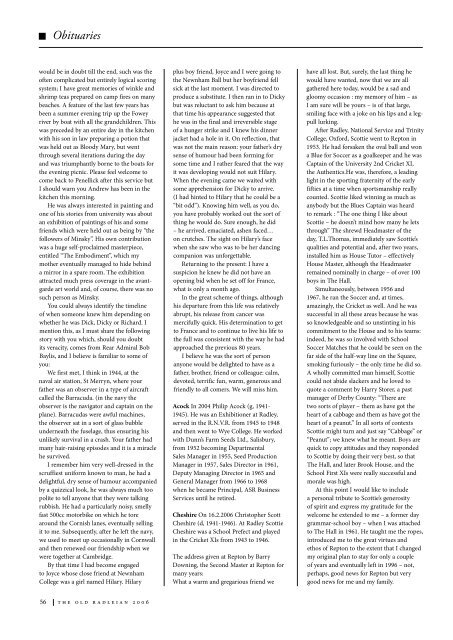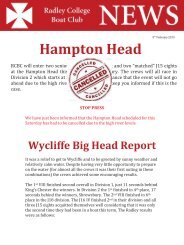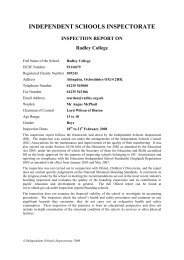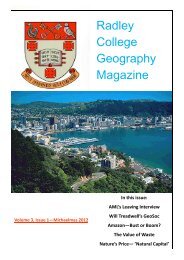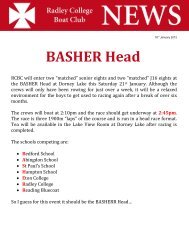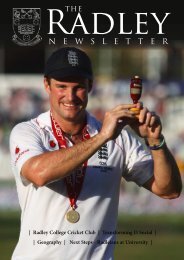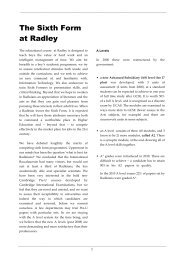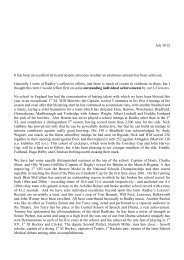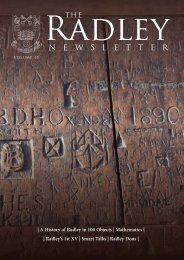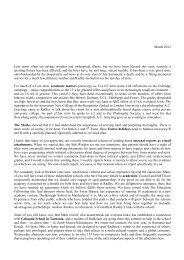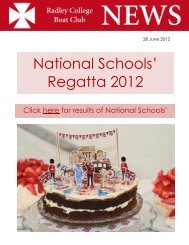Obituaries - Radley College
Obituaries - Radley College
Obituaries - Radley College
You also want an ePaper? Increase the reach of your titles
YUMPU automatically turns print PDFs into web optimized ePapers that Google loves.
<strong>Obituaries</strong><br />
would be in doubt till the end, such was the<br />
often complicated but entirely logical scoring<br />
system; I have great memories of winkle and<br />
shrimp teas prepared on camp fires on many<br />
beaches. A feature of the last few years has<br />
been a summer evening trip up the Fowey<br />
river by boat with all the grandchildren. This<br />
was preceded by an entire day in the kitchen<br />
with his son in law preparing a potion that<br />
was held out as Bloody Mary, but went<br />
through several iterations during the day<br />
and was triumphantly borne to the boats for<br />
the evening picnic. Please feel welcome to<br />
come back to Penellick after this service but<br />
I should warn you Andrew has been in the<br />
kitchen this morning.<br />
He was always interested in painting and<br />
one of his stories from university was about<br />
an exhibition of paintings of his and some<br />
friends which were held out as being by “the<br />
followers of Minsky”. His own contribution<br />
was a huge self-proclaimed masterpiece,<br />
entitled “The Embodiment”, which my<br />
mother eventually managed to hide behind<br />
a mirror in a spare room. The exhibition<br />
attracted much press coverage in the avantgarde<br />
art world and, of course, there was no<br />
such person as Minsky.<br />
You could always identify the timeline<br />
of when someone knew him depending on<br />
whether he was Dick, Dicky or Richard. I<br />
mention this, as I must share the following<br />
story with you which, should you doubt<br />
its veracity, comes from Rear Admiral Bob<br />
Baylis, and I believe is familiar to some of<br />
you:<br />
We first met, I think in 1944, at the<br />
naval air station, St Merryn, where your<br />
father was an observer in a type of aircraft<br />
called the Barracuda. (in the navy the<br />
observer is the navigator and captain on the<br />
plane). Barracudas were awful machines,<br />
the observer sat in a sort of glass bubble<br />
underneath the fuselage, thus ensuring his<br />
unlikely survival in a crash. Your father had<br />
many hair-raising episodes and it is a miracle<br />
he survived.<br />
I remember him very well-dressed in the<br />
scruffiest uniform known to man, he had a<br />
delightful, dry sense of humour accompanied<br />
by a quizzical look, he was always much too<br />
polite to tell anyone that they were talking<br />
rubbish. He had a particularly noisy, smelly<br />
fast 500cc motorbike on which he tore<br />
around the Cornish lanes, eventually selling<br />
it to me. Subsequently, after he left the navy,<br />
we used to meet up occasionally in Cornwall<br />
and then renewed our friendship when we<br />
were together at Cambridge.<br />
By that time I had become engaged<br />
to Joyce whose close friend at Newnham<br />
<strong>College</strong> was a girl named Hilary. Hilary<br />
plus boy friend, Joyce and I were going to<br />
the Newnham Ball but her boyfriend fell<br />
sick at the last moment. I was directed to<br />
produce a substitute. I then ran in to Dicky<br />
but was reluctant to ask him because at<br />
that time his appearance suggested that<br />
he was in the final and irreversible stage<br />
of a hunger strike and I knew his dinner<br />
jacket had a hole in it. On reflection, that<br />
was not the main reason: your father’s dry<br />
sense of humour had been forming for<br />
some time and I rather feared that the way<br />
it was developing would not suit Hilary.<br />
When the evening came we waited with<br />
some apprehension for Dicky to arrive.<br />
(I had hinted to Hilary that he could be a<br />
“bit odd”). Knowing him well, as you do,<br />
you have probably worked out the sort of<br />
thing he would do. Sure enough, he did<br />
– he arrived, emaciated, ashen faced…<br />
on crutches. The sight on Hilary’s face<br />
when she saw who was to be her dancing<br />
companion was unforgettable.<br />
Returning to the present: I have a<br />
suspicion he knew he did not have an<br />
opening bid when he set off for France,<br />
what is only a month ago.<br />
In the great scheme of things, although<br />
his departure from this life was relatively<br />
abrupt, his release from cancer was<br />
mercifully quick. His determination to get<br />
to France and to continue to live his life to<br />
the full was consistent with the way he had<br />
approached the previous 80 years.<br />
I believe he was the sort of person<br />
anyone would be delighted to have as a<br />
father, brother, friend or colleague: calm,<br />
devoted, terrific fun, warm, generous and<br />
friendly to all comers. We will miss him.<br />
Acock In 2004 Philip Acock (g, 1941-<br />
1945). He was an Exhibitioner at <strong>Radley</strong>,<br />
served in the R.N.V.R. from 1945 to 1948<br />
and then went to Wye <strong>College</strong>. He worked<br />
with Dunn’s Farm Seeds Ltd., Salisbury,<br />
from 1952 becoming Departmental<br />
Sales Manager in 1955, Seed Production<br />
Manager in 1957, Sales Director in 1961,<br />
Deputy Managing Director in 1965 and<br />
General Manager from 1966 to 1968<br />
when he became Principal, ASR Business<br />
Services until he retired.<br />
Cheshire On 16.2.2006 Christopher Scott<br />
Cheshire (d, 1941-1946). At <strong>Radley</strong> Scottie<br />
Cheshire was a School Prefect and played<br />
in the Cricket XIs from 1943 to 1946.<br />
The address given at Repton by Barry<br />
Downing, the Second Master at Repton for<br />
many years:<br />
What a warm and gregarious friend we<br />
have all lost. But, surely, the last thing he<br />
would have wanted, now that we are all<br />
gathered here today, would be a sad and<br />
gloomy occasion : my memory of him – as<br />
I am sure will be yours – is of that large,<br />
smiling face with a joke on his lips and a legpull<br />
lurking.<br />
After <strong>Radley</strong>, National Service and Trinity<br />
<strong>College</strong>, Oxford, Scottie went to Repton in<br />
1953. He had forsaken the oval ball and won<br />
a Blue for Soccer as a goalkeeper and he was<br />
Captain of the University 2nd Cricket XI,<br />
the Authentics.He was, therefore, a leading<br />
light in the sporting fraternity of the early<br />
fifties at a time when sportsmanship really<br />
counted. Scottie liked winning as much as<br />
anybody but the Blues Captain was heard<br />
to remark : “The one thing I like about<br />
Scottie – he doesn’t mind how many he lets<br />
through” The shrewd Headmaster of the<br />
day, T.L.Thomas, immediately saw Scottie’s<br />
qualities and potential and, after two years,<br />
installed him as House Tutor – effectively<br />
House Master, although the Headmaster<br />
remained nominally in charge – of over 100<br />
boys in The Hall.<br />
Simultaneously, between 1956 and<br />
1967, he ran the Soccer and, at times,<br />
amazingly, the Cricket as well. And he was<br />
successful in all these areas because he was<br />
so knowledgeable and so unstinting in his<br />
commitment to the House and to his teams:<br />
indeed, he was so involved with School<br />
Soccer Matches that he could be seen on the<br />
far side of the half-way line on the Square,<br />
smoking furiously – the only time he did so.<br />
A wholly committed man himself, Scottie<br />
could not abide slackers and he loved to<br />
quote a comment by Harry Storer, a past<br />
manager of Derby County: “There are<br />
two sorts of player – them as have got the<br />
heart of a cabbage and them as have got the<br />
heart of a peanut.” In all sorts of contexts<br />
Scottie might turn and just say “Cabbage” or<br />
“Peanut”; we knew what he meant. Boys are<br />
quick to copy attitudes and they responded<br />
to Scottie by doing their very best, so that<br />
The Hall, and later Brook House, and the<br />
School First XIs were really successful and<br />
morale was high.<br />
At this point I would like to include<br />
a personal tribute to Scottie’s generosity<br />
of spirit and express my gratitude for the<br />
welcome he extended to me – a former day<br />
grammar-school boy – when I was attached<br />
to The Hall in 1961. He taught me the ropes,<br />
introduced me to the great virtues and<br />
ethos of Repton to the extent that I changed<br />
my original plan to stay for only a couple<br />
of years and eventually left in 1996 – not,<br />
perhaps, good news for Repton but very<br />
good news for me and my family.<br />
56 t h e o l d r a d l e i a n 2 0 0 6


